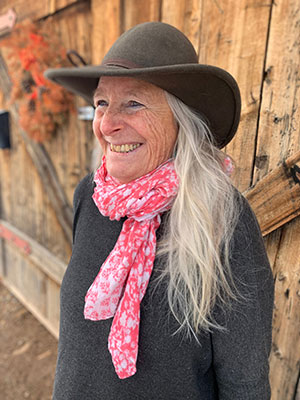
While most of the political world’s attention was focused this year on the U.S. Presidential race and other federal contests, thousands of other candidates were on the November 3rd ballot running on the state, county, and local level. Among them were at least two Westover alumnae: Frances “Francie” Perry Jacober ’65, who ran successfully for a seat as a Pitkin County Commissioner in Colorado, and Sarita Bhandarkar ’94, who ran unsuccessfully to serve as a representative to the New York State Assembly for District 99.
This year’s elections marked the first time either woman had run for political office. And though their experiences had different outcomes, they both found the experiences challenging but worthwhile.
A New Chapter In Public Service
Although her run for county commissioner was indeed her first try for public office, Francie noted that “I have been in public service for years because I had been a teacher forever before I retired.”
because I had been a teacher forever before I retired.”
Pitkin County is best known for its county seat — Aspen — and its fame as a renowned ski resort, but much of largely rural county is devoted to agriculture and wilderness. So, the work of the five county commissioners is critical in guiding a broad range of county-wide policies to preserve and enhance the county’s resources and opportunities.
Francie said her son had initially been approached to run for the post, but his business commitments prevented him from considering the office. He encouraged Francie to seek the position instead and she quickly agreed. Because her son was well-known in the county, she added, “to a certain extent, I was riding on my son’s coattails.”
Having recently retired from teaching, Francie admitted that she was feeling restless and unchallenged, even though she was still working 10 to 20 hours a week managing a family restaurant.
A Democrat, Francie said “when I first started running, I was unopposed.” On the last date that a candidate could file to run, an opponent — best known for his anti-government positions through his frequent letters to the editor in the local newspaper — stepped forward.
After Francie won the race for her four-year term by a vote of 7,603 to 2,895, she told the paper that her opponent’s entry into the race “inspired me to work hard and think deeper.”
Francie said her campaign platform initially centered primarily on support for the county’s agriculture, the impact of climate change on the environment, and a range of community needs — especially disparities in education funding, the need for increased child care services, and a growing lack of affordable housing. She later added support for undocumented workers as part of her platform.
Francie noted how difficult it was to run a virtual campaign. “I only spoke to constituents on one occasion,” she explained. “The rest of my communications were entirely by email, including securing enough petition signatures to be on the ballot, and then fundraising. I obviously hadn’t anticipated that and I really missed face-to-face contact with people.”
Despite an occasional instance of “toxicity” that Francie would encounter while campaigning, she was gratified by “the tremendous amount of support and encouragement I received from all over the county.”
And for the next four years at least, she definitely will no longer feel like a restless retiree.
Lessons From Her First Political Campaign
 An estate planning and elder law attorney in Cornwall, New York, Sarita said she, like many others, first got actively involved in politics in the wake of the divisive 2016 election. The day after the Presidential inauguration in January 2017, Sarita traveled to New York City to take part in the massive Women’s March that helped galvanize a new commitment for many participants to be active in the political process.
An estate planning and elder law attorney in Cornwall, New York, Sarita said she, like many others, first got actively involved in politics in the wake of the divisive 2016 election. The day after the Presidential inauguration in January 2017, Sarita traveled to New York City to take part in the massive Women’s March that helped galvanize a new commitment for many participants to be active in the political process.
Over the next several years, Sarita worked as the campaign treasurer on a fellow Democrat’s county and local runs for office. Sarita also became a member of both her town and county party committees.
This year, Sarita said, “I kept checking to see if anyone was running” against the first-term Republican incumbent who held the district’s Assembly seat, a man whom she described as “a super, super conservative” whom she strongly disagreed with on many positions and who she felt did not truly represent the best interests of his constituents.
“I kept waiting for someone to step forward,” Sarita recalled, but as the election deadline drew near, no Democratic candidate was announced. “I felt very strongly that someone should run against him,” she said. “I don’t like it when people are running unopposed.”
Sarita believed that so strongly that she decided to run for the Assembly seat herself.
Looking back, Sarita has no regrets but acknowledged that “it was a brutal nine months of campaigning. I did not know how much work it was going to be” — an effort complicated by the COVID-19 pandemic and the resulting economic shutdown, which made fundraising for her campaign a significant challenge.
Sarita campaigned on keeping the Hudson Valley affordable for working families by lowering property taxes and finding alternate sources of revenue for school funding. She also focused on protecting the environment, sustainable development, and bringing green jobs with living wages to the region.
As an elder law attorney, Sarita noted that she has too often seen elderly people in her district face financial problems resulting from medical costs, long-term care, and home-care costs that “spend down all of their life savings.” At the same time, she said, governmental policies were creating development in her district that provided little or no “living-wage jobs on a larger scale” for residents but offered “short-term profitable benefits for the very few.” These problems make it difficult for retirees to age in place and challenging to draw young people back to their communities after graduation.
Sarita feels her campaign efforts were hampered by several factors. As an incumbent, her opponent already had greater name recognition. “And, because of the pandemic,” she explained, “I couldn’t go door-to-door to let the voters get to know me,” and the resulting economic downturn limited fundraising efforts that could have helped raise her profile.
Sarita was also targeted by a negative media campaign run by her opponent, who she said sent out thousands of mailers and social media posts that made false claims about Sarita in an effort to make her appear to be an extremist in favor of letting criminals out of jail and defunding the police. While these tactics were used against many Democrats in this past election, she said, as a first-generation American, Sarita found that these false accusations triggered a racist, xenophobic response from some voters in the district who would make assumptions about her background and who would tell her to “go back to where you come from.” She reflected, “As naive as it sounds, I didn’t anticipate any of that. I didn’t anticipate that my opponent would just make up lies or try to stir up hate.”
Despite such discouraging developments and her ultimate loss, Sarita had this to say about her first-time candidacy:
“It was totally worth it. It was a ton of work, but I met a lot of cool people through the process, especially a lot of young people who are interested and energized, and who give me a lot of hope for the future, as well as a lot of older people who are committed to environmentalism and have been since the 1960s. Really amazing people.”
As a result, Sarita said, “I am not taking a break from politics. I will be focusing on the local level,” including support for recently passed state measures for police reform that are implementing change on the community level, environmental issues in the Hudson Valley, and local programs that are addressing Black Lives Matter concerns and xenophobia.
Sarita credited her experiences at Westover for her determination. “Westover really did have a lot to do with helping so many of us — it gave us a willingness to speak up more; it gave us the awareness that we have a right to have a voice.”
.pdf&command_2=resize&height_2=85)






.jpg&command_2=resize&height_2=85)




%20(1)%20(1).jpg&command_2=resize&height_2=85)


.jpg&command_2=resize&height_2=85)
.JPG&command_2=resize&height_2=85)

%20w%20Raleway.jpg&command_2=resize&height_2=85)

